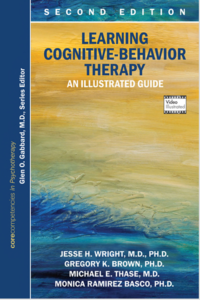 Translated into Farsi, Portuguese, Korean, Japanese, Chinese-Simplified, Chinese-Classical and Slovak languages
Translated into Farsi, Portuguese, Korean, Japanese, Chinese-Simplified, Chinese-Classical and Slovak languages
ISBN 1585621536 (ISBN13: 9781585621538)
Learning Cognitive-Behavior Therapy: An Illustrated Guide
(2nd Edition)
Building on its successful -read-see-do- approach, this second edition of Learning Cognitive-Behavioral Therapy: An Illustrated Guide seamlessly combines 23 all-new videos with informative text and figures, charts, worksheets, checklists, and tables to help readers not only learn the essential skills of CBT but achieve competence in this important evidence-based treatment method.
Opening with an overview of core cognitive-behavior therapy (CBT) theories and techniques, leading CBT practitioners then describe and demonstrate how to build effective therapeutic relationships with CBT, conceptualize a case with the CBT model, structure sessions, and resolve common problems encountered in CBT.
- “This book is one of my favorites. It is in the very top rank of CBT texts and stands alone in its masterful blending of text and video.”—Aaron T. Beck, M.D., University Professor Emeritus of Psychiatry, University of Pennsylvania
- “This second edition of the book is a superb manual for incorporating cognitive behavior strategies in everyday clinical practice. This highly readable guide is an essential reference for health care providers, who may understand when cognitive-behavior therapy is indicated and how it can be accomplished. It provides a state-of-the art practical summary of the field, that reflects the outstanding teaching experience of the authors.”—Giovanni A. Fava, M.D., Editor-in-Chief, Psychotherapy and Psychosomatics; Professor of Clinical Psychology, University of Bologna, Bologna, Italy
- "Besides the original CBT manuals, I can think of no better resource for therapists wishing to learn the science and art of CBT. It is written with extraordinary precision and clarityl, so that CBT therapists at all stages of their careers can develop and sharpen their skills so as to best serve their clients. The authors are evidently master CBT therapists and trainers as readers will be inspired to learn to become more effective CBT therapists.”—Willem Kuyken, Professor of Clinical Psychology, University of Oxford
- “Learning Cognitive-Behavior Therapy: An Illustrated Guide, Second Edition: Core Competencies in Psychotherapy summarizes CBT principles, processes and interventions in an easy to read format. It offers a succinct introduction for psychiatric residents or therapists new to CBT and will whet your appetite to learn more.”—Christine A. Padesky, Ph.D., Distinguished Founding Fellow, Academy of Cognitive Therapy

 Translated into Portuguese, Japanese and Chinese-Simplified languages
Translated into Portuguese, Japanese and Chinese-Simplified languages Translated into Portuguese, Turkish, Korean, Japanese and Chinese-Simplified languages
Translated into Portuguese, Turkish, Korean, Japanese and Chinese-Simplified languages